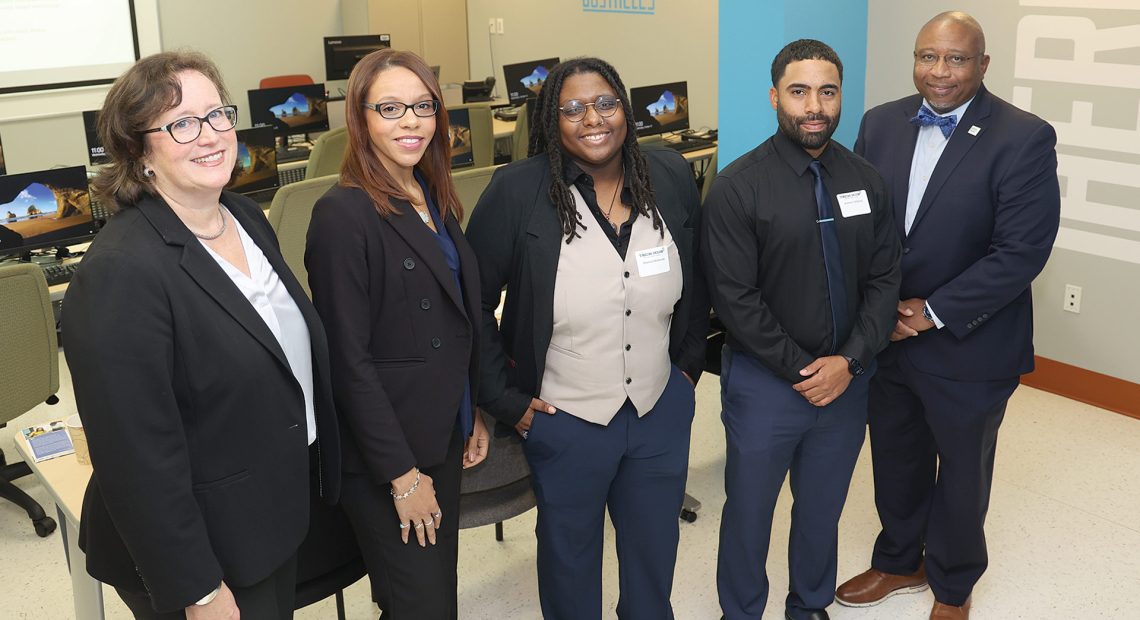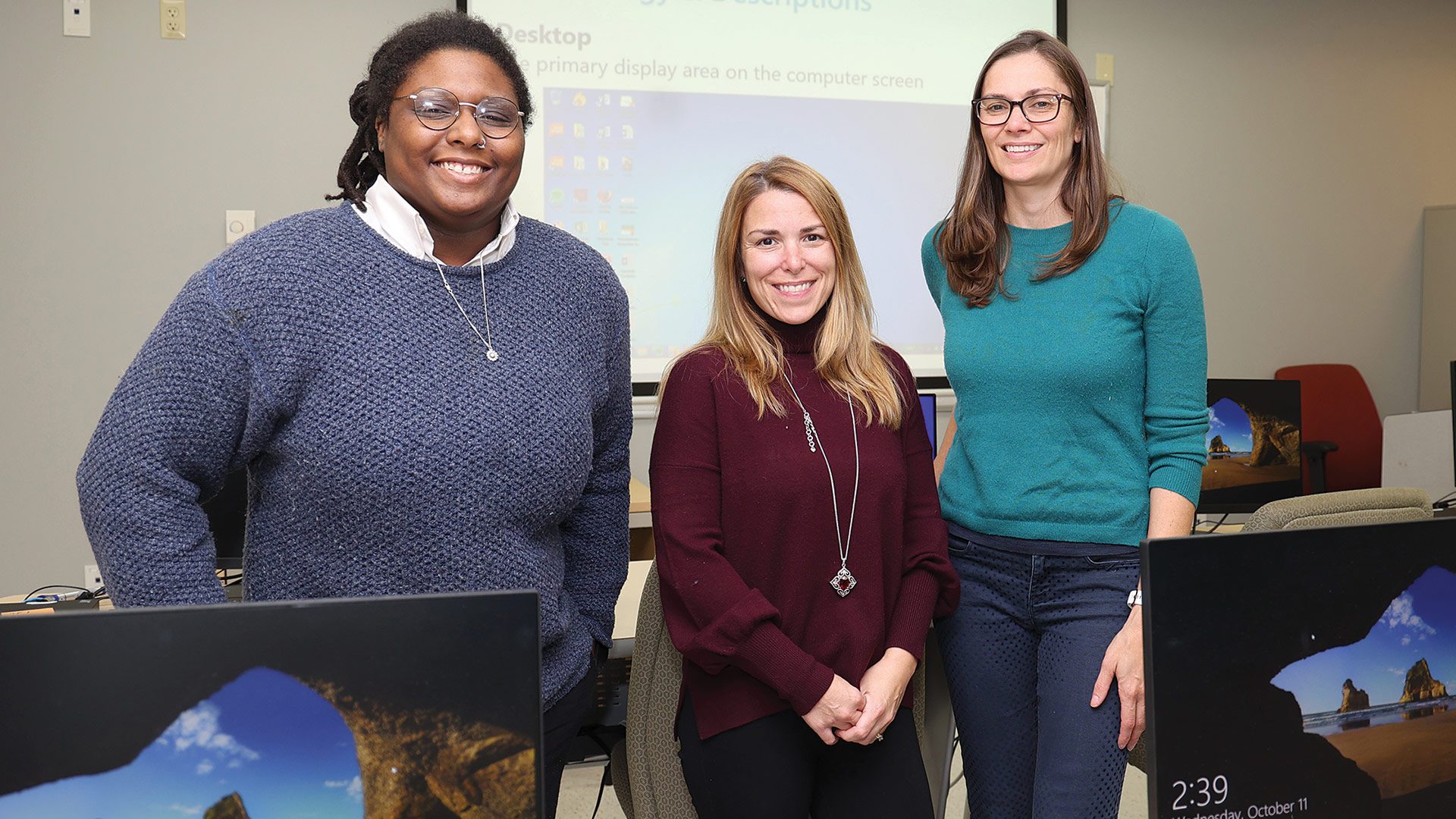
Tech Foundry CEO Tricia Canavan Is Excited About Latest Project
Promising Pipeline

Tricia Canavan (far left) and HCC President George Timmons (far right) in the Tech Hub digital classroom with Tech Foundry graduates (and current Tech Hub fellows) Lasharie Weems, Shanice McKenzie, and Anelson Delacruz.
Tech Foundry was launched in 2014 with a specific goal: to increase the technology workforce in Western Mass. at a time when employers were struggling to attract and retain talent.
“Since then, we’ve grown and really have focused on working with low- to moderate-income people and also people from non-traditional backgrounds who may be underrepresented in the tech sector,” said Tricia Canavan, who came on board as Tech Foundry’s CEO last year.
The nonprofit does so by offering professional development, technical career training, career coaching and internships, and job placement in order to connect people to existing IT opportunities, she added. “We’re very proud of the fact that our alums access living-wage jobs and are on these great career pathways.”
If anything, she noted, the need for Tech Foundry is stronger than ever. Recent studies of the workforce environment in Massachusetts suggest up to 400,000 people need to be attracted, recruited, or reskilled in order to keep business in the Bay State humming at optimal levels — many of those in the broad realm of IT.
“There has been a talent shortage in the tech sector and in other sectors, even pre-pandemic, but since the pandemic, we’ve seen those trends accelerate.”
“We all know that the tech sector is on fire, and there are lots and lots of opportunities for growth, and you don’t always need a college degree to access those things,” Canavan said of Tech Foundry’s innovative model that lets students stack certifications to help them get their foot in the door in IT and then progress up the career ladder.
“There has been a talent shortage in the tech sector and in other sectors, even pre-pandemic, but since the pandemic, we’ve seen those trends accelerate,” she added.
The reasons are varied, from mass retirements of Baby Boomers — which means the departure of much senior and middle management, as well as rank-and-file IT workers, from the workforce — to fewer children in the K-12 pipeline.
“Just by sheer numbers, we have fewer kids that are going to be graduating from high school and entering the workforce and/or going to college — that’s fewer kids to engage as young professionals once they complete their education. Also, some of the forecasts that I’ve seen have upwards of 60,000 young professionals projected to move from Massachusetts,” she added, for reasons ranging from cost of living to a housing shortage.
“It’s sort of this perfect storm of economic conditions that are creating persistent needs in the workforce for workers of all types, but there is absolutely a need for more workers in the tech sector.”

Tricia Canavan says Tech Hub is a way to address the region’s digital divide.
The core, 18-week Tech Foundry program has helped produce more of those workers locally, but the nonprofit is equally excited about its newest initiative, called Tech Hub, a broad collaboration that also includes Holyoke Community College (HCC), the Western Massachusetts Alliance for Digital Equity, the Massachusetts Broadband Institute, the Accelerate the Future Foundation, Comcast, Google, Bulkley Richardson, and other partners.
“This has been created as part of the Western Mass. Alliance for Digital Equity’s efforts to address digital equity, and the digital divide here in Western Mass.,” Canavan explained. “We, as part of the consortium working on the digital divide in Western Mass., identified an opportunity to be able to support digital-equity efforts while also continuing professional-development training for our staff, students, and alums.”
Located at 206 Maple St. in downtown Holyoke, Tech Hub, which opened to the public on Oct. 26, offers basic and intermediate digital-literacy training, with an eye on enabling people to access jobs of all kinds, not just specifically in IT.
“It starts off as basic as, ‘do you know how to use a mouse? Do you know how to use a trackpad? This is how you get on the internet,’ all the way up to exposure to things like Google Sheets, Google Docs, Microsoft Word, Excel, that sort of thing. We want to help people access the basic digital literacy that they need to thrive at work, at school, in healthcare, and connecting to others in the community.”
That’s the first leg of the Tech Hub stool, she explained; the others are providing computers free of charge to eligible people, and providing technical support and one-on-one troubleshooting services to people in the community.
“Everybody probably has someone in their family that uses technology but maybe is not an expert. When they have a problem, where do they go? So we envision providing that support for the community through Tech Hub.”
Confidence Restored
As a single, stay-at-home mother with young boys, Lasharie Weems often felt overwhelmed — particularly when it came to technology. “My 5-year old was probably more digitally literate than I was,” she said.
The remote instruction her children required during the pandemic proved even more baffling, she added. “My older two sons go to a science and technology school. I struggled to even help them with their homework.”
“We want to help people access the basic digital literacy that they need to thrive at work, at school, in healthcare, and connecting to others in the community.”
After enrolling in Tech Foundry’s free, 18-week program, she said her confidence was restored, and it actually brought her family closer together.
Weems now works for Tech Foundry. She told her story at the grand opening of Tech Hub, where she will be serving as an American Connection Corps fellow.
“Today is an exciting occasion for all of us,” Weems she told the crowd assembled outside Tech Hub’s digital classroom. “But for me, it’s a personal achievement as I celebrate the journey it took to get me here. Tech Hub is my opportunity to pay it forward, to help countless others identify and bridge the gap in digital equity.”
Canavan said connections like that are important.
“What was exciting to us about this project was the ability to expand the impact of Tech Foundry, but we’re also staffing Tech Hub in part with alums of Tech Foundry through a one-year professional digital fellowship program,” she explained. “They work under the guidance of Tech Foundry staff to provide the training and technical support services. In addition, we will have students who will be doing co-op and internship work while they’re in the program.”

From left: Tech Hub fellow Shanice McKenzie, Tech Hub manager Shannon Mumblo, and Tech Foundry deputy director Michelle Wilson in the Tech Hub digital classroom.
HCC President George Timmons said it was fitting for Tech Hub to be based at the Picknelly Adult & Family Education Center (PAFEC), one of the college’s satellite campuses in the heart of the city, which also houses HCC’s Adult Learning Center as well as other community programs, including the Holyoke High Opportunity Academy, an alternative public high-school program.
“The mission of Holyoke Community College is to educate, inspire, and connect,” he said. “Through this initiative, we hope to promote access to technology and connectivity, digital literacy, and education, while giving individuals the tools they need to be successful.”
Holyoke Mayor Joshua Garcia agreed, noting that four students who attend the Holyoke High Opportunity Academy at PAFEC have already signed up to be part of the Tech Hub program.
“I think we can all agree that digital literacy in 2023 is as vital as reading literacy was 50 years ago,” the mayor said. “Whether it’s filling out a job application, communicating with a customer, maintaining accessible records, or even booking a flight, digital fluency is a necessary life skill.
“But the Tech Hub mission recognizes something else: that there exists a digital divide that is the result of inequities in access, opportunity, housing, income, and schooling,” he went on. “The free training and support that will take place at this site and at community partner locations is going to be a liberating game changer.”
Opportunity Knocks
Meanwhile, important work continues at Tech Foundry, Canavan said, and applications for the next cohort of students are open at thetechfoundry.org through December.
“We work very intentionally to engage with the community to get the word out about TechFoundry, and there are a lot of different strategies that we use to do that,” she noted, including social media, referrals from community organizations, and partnering with schools to make students aware that Tech Foundry can be a career-development option for them.
“I think it’s a really good option for people because the training is excellent,” she added. “It’s really an intensive training with a great track record of people accessing employment in the tech sector after they graduate, and it’s at no cost.”
Canavan, who has a deep background in nonprofit management and was also president of a staffing agency, United Personnel, said it’s gratifying to see people come through the Tech Foundry program and improve their lives, and she’s hoping for similar impact from Tech Hub.
“I was eager to return to the nonprofit world after selling my business a couple of years ago and felt very fortunate when this job was open at Tech Foundry. I think it’s a great opportunity for me to use my background in recruiting and staffing and also leverage the workforce and economic-development work that I was doing in that role in the nonprofit world, in partnership with residents and community partners and employers,” she told BusinessWest.
“I love this job because it’s pragmatic and solutions-focused,” she added. “There’s tons of opportunity right now, so how do we work together to help residents of Western Mass. access those opportunities? It’s exciting.”




